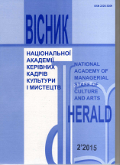ABOUT SOME LEVELS AND ELEMENTS OF THE SYSTEM OF SOCIETY’S MUSICAL ART IN TERMS OF "CULTURE AND PERSONALITY" PROBLEM
DOI:
https://doi.org/10.32461/2226-3209.2.2015.138399Keywords:
system of society’s musical art, personality, subject, creative intellectuals, artist, musical art, folklore, amateurismAbstract
The article deals with some levels and elements of the system of society’s musical art with the aim to identify their personal (subjective) content. It gives scientific interpretations of the phenomenon of the intellectuals’ creative activity, shows the process of the creation, performance, perception, and critical understanding of a piece of music. The author emphasizes the anthropological and creative features of the artists, defines the following terms: the subjects of the creative activity, professionalism, typology of the subjects of art, and the professional composer. The article pays attention to the structure of the ethnic folk culture, to the people as a subject of art creation and perception, to the subjects of the folk and amateur art. The article also characterizes the features of the amateur music, the audience and its variations, the subjects of artistic and critical activities. The author circles out the subjects that organize the artistic process, disseminate it, promote the works of art, prepare the audience to the artistic activities, and contribute to the reproduction of the artistic process.Downloads
Published
Issue
Section
License
Authors who publish with this journal agree to the following terms:
1. Authors retain copyright and grant the journal right of first publication with the work simultaneously licensed under a Creative Commons Attribution License International CC-BY that allows others to share the work with an acknowledgement of the work's authorship and initial publication in this journal.
2. Authors are able to enter into separate, additional contractual arrangements for the non-exclusive distribution of the journal's published version of the work (e.g., post it to an institutional repository or publish it in a book), with an acknowledgement of its initial publication in this journal.
3. Authors are permitted and encouraged to post their work online (e.g., in institutional repositories or on their website) prior to and during the submission process, as it can lead to productive exchanges, as well as earlier and greater citation of published work (See The Effect of Open Access).


